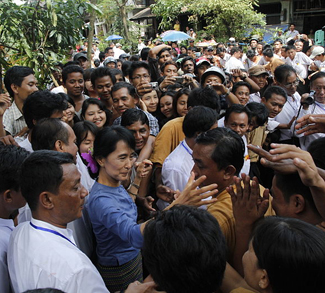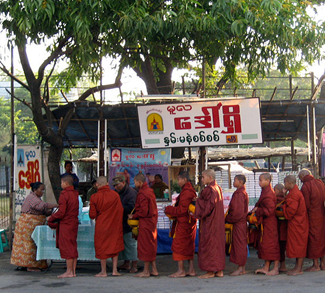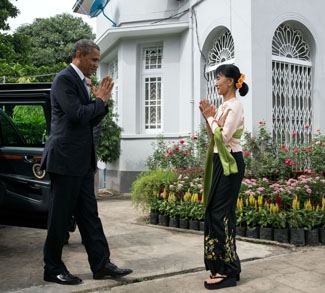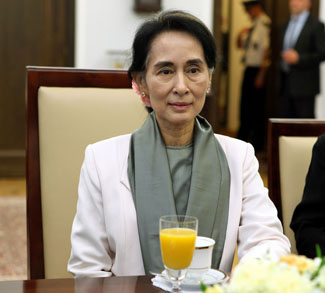After an uncharacteristically long and pointed period of silence regarding the ongoing anti-Muslim violence being perpetrated in western Myanmar, pro-democracy and human rights leader Aung San Suu Kyi has finally spoken out.
In June of 2012, a string of violent inter-ethnic crimes spiralled into region-wide rioting and violence between the Rohingya, a small Muslim minority, and the non-Muslim ethnic inhabitants of Rakhine, a state in Burma. Unable to quell the violence using normal means, the government was forced to send the military into Rakhine to restore order, though to little effect. In fact, many reports go so far as to suggest that the military took a lead role in terrorizing the Rohingya and perpetuating the violence. Though the exact toll is unknown, a resurgence of violence in the past several weeks has increased the number of displaced Rohingya to over 100,000.
For months following the initial outbreak, Aung San Suu Kyi was conspicuously silent on the issue. Aside from her tireless work to promote democracy in Myanmar, including her decades under house arrest as a political prisoner under the former military government, Suu Kyi is especially well known for her work on behalf of the marginalized sectors of Burmese society, including its various ethnic groups.
Last week, Suu Kyi broke her long silence and released a statement directing the government to send more troops to the troubled region in order to ensure a return to peace and security. She commented on a governmental and social responsibility to ensure that everyone is guaranteed safety and fundamental human rights, irrespective of race, religion, or ethnicity. Though it was clear what she was referring to, she avoided directly mentioning the Rohingya.
Though a departure from her typically fearless defence of democracy and human rights, Suu Kyi’s reluctance to take up the Rohingya cause is hardly a mystery. Tension between Myanmar’s larger ethnic groups (including the Buddhist majority and non-Muslim Rakhine) and the Rohingya dates back to long before this incident. Discrimination, both official and unofficial, has plagued the Rohingya for decades. There exists a piece of legislation, for example, explicitly establishing them as non-citizens and disavowing the government of the responsibility to provide for them. Such practices have led the United Nations to refer to the Rohingya as one of the most ostracized groups in the world.
Aung San Suu Kyi and her political party, the National League for Democracy have begun to make real progress against the military-favoured, dubiously civilian ruling party. Having swept virtually every parliamentary seat in by-elections earlier this year, they are heavily favoured to continue to win seats and form the government in general elections that are scheduled for 2015.
After so long on the fringes of official governance in Myanmar, Suu Kyi is, at long last, officially sanctioned and close to gaining power. This puts her in the difficult position of having to balance her morals and values with the need to play politics. Unfortunately, the fact is that the Rohingya are widely reviled by the general population in Myanmar. Highly respected and influential monks recently organized large, well-attended rallies supporting the current Prime Minister’s proposal to deport the Rohingya from the country. As a result, Suu Kyi likely feels that coming out too strongly in support of the Rohingya- needful though they are of her support and moral authority- might jeopardize the position of the NLD in mainstream politics.
It had been a question of some uncertainty whether Aung San Suu Kyi would comment at all, but given her position as a voice for the disenfranchised in Burma, it was likely just a matter of time. However, after such a long wait, her somewhat generic comments and refusal to mention the Rohingya by name have left many disappointed. Her reluctance to be more vocal on this ongoing human rights crisis, however, is most likely explained by the social pressures of mainstream politics. If she is to capitalize on her party’s growing success in Parliament, she may wish to avoid driving away potential supporters by siding with the widely-disliked Rohingya, especially as the current Prime Minister appeals to the public at their expense. Nonetheless, as the violence continues to flare up and as the international spotlight continues to shine on Rakhine, it is anyone’s guess as to whether she will maintain this guarded stance.




